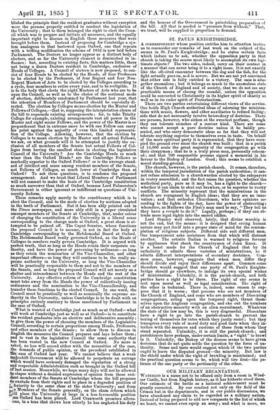ST. PAUL'S KNIGHTSBRIDGE.
A coanssposrmar whose position entitles him to attention invites us to reconsider our remarks of last week on the subject of the scenes in St. Paul's Knightsbridge ; and he states certain facts which induce us to ask, whether the opposition party in that church is taking the course most likely to accomplish its own legi- timate objects P The two sides, indeed, carry on their contest in a manner that can never bring it to a right issue. It is not exactly like the oft-cited encounter between the dog and the fish, for the fight actually goes on, and is severe. But we are not yet convinced that either side is fully entitled to a victory. The ease is alto- gether anomalous ; but it belongs so much to the anomalous state of the Church of England and of society, that we do not see any practicable means of closing the scandal, unless the opposition could be converted to Christianity in its higher spirit of charity as well as in its ruder spirit of Protestantism.
There are two parties entertaining different views of the service. One holds High Church anthetical ideas of adorning the ministra- tions with music, flowers, and other auxiliaries to refined feeling ; aids that do not necessarily involve heterodoxy of ,doctrine. There are persons, however, who sicken at the sweetest perfume, though they can tolerate stenches of a coarser kind. There are some who cannot accept a pure doctrine unless it be baldly pre- sented, and who carry democratic ideas so far that they will not tolerate anything superior to themselves even in taste. On behalf of the more spiritual party it is represented, that they have occu- pied the ground ever since the church was built ; that in a parish of 15,000 souls the great majority of the congregation go with their clergyman; that he is a truly pious man, personally esteem- ed ; and that 700 responsible persons signed a memorial in his favour to the Bishop of London. Good; this seems to establish a moral standing-ground.
The church, however, is the parish-church. It comes, therefore, within the temporal jurisdiction of the parish authorities; it can- not refuse admission to a churchwarden- elected by the ratepayers in vestry assembled; and the fact raises the question, whether the testhetical party, pure as it may be, has a right to the church— whether it can claim to shut out brawlers, or be superior to vestry conflicts. The minority represent that the ministrations in the church are repugnant to English ideas; that they are an inno- vation ; and that orthodox Churchmen, who have opinions ac- cording to the lights of the day, have the power of obstructing; wherefore, as Mathews the First's man used to say, " They tell us they have a rrright to do it." Legally, perhaps ; if they can ob- trude mere legal rights into the sacred edifice.
Lord Stanley well observed, lately, that divine worship is not the end, but the means: it is designed that erring human nature may put itself into a proper state of mind for the oontem- plation of religious subjects. Different aids suit different men. One temperament asks assistance from that which will distract another. The artistic Italian is warmed to religious fervour by appliances that shock the countrymen of John Knox. It is a boast made for the Church of England that by its catholicity it admits these varieties of ministrations, as it admits different interpretations of secondary doctrines. Com- mon sense, however, suggests that when men differ they should divide and enjoy their differences apart. Common sense therefore would suggest that one party of St. Paul's Knights- bridge should go elsewhere, to indulge its own special wishes of ministration. Unluckily, it is the parish church, and both parties have a right to be there. The right of one seems to rest upon moral as well as legal consideration. The right of the other is technical. There is, indeed, some reason to sup- pose that it is worse ; that persons who are not members of the Church of England, and some who are members of Dissenting congregations, acting upon the temporal right, thrust them- selves upon the Anglican congregation, and eke out the numbers of an obstructive minority with an alien recruitment. Whatever the state of the law may be, this is very disgraceful. Dissenters have a right to go into the parish-church to prevent the taxing of themselves for rates which they 'justly resist ; but they transgress every rule of moral duty and good taste when they in- terfere with the manners and customs of those from whom they stand separated. Unluckily, it is still the parish-church ; and parishioners have perhaps, under certain limits, a " right" to brawl in it. Unluckily, the Bishop of the diocese seems to have given decisions that do not quite settle the question by the force of au- thority. Sense and taste would suggest which of the two parties ought to leave the disputed ground—the minority. But law is the shield under which the right of brawling is maintained; and the practical question seems to be, which will tire first—the pa- tience of the one party or the pertinacity of the other.


























 Previous page
Previous page